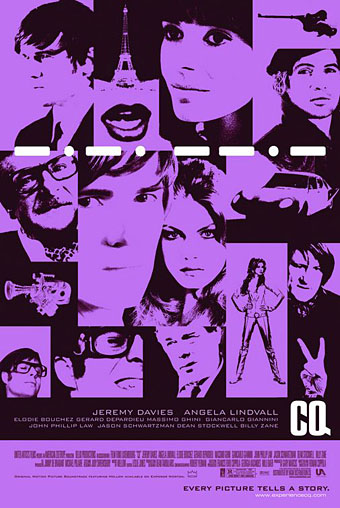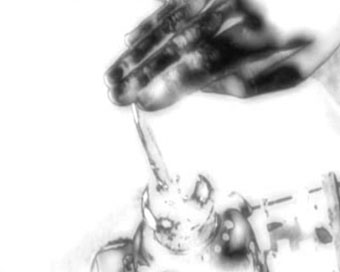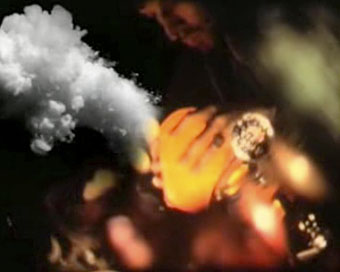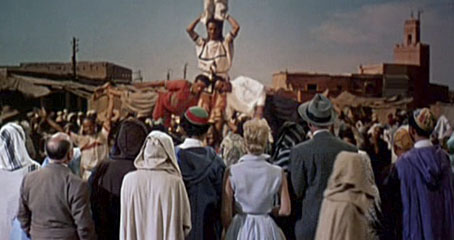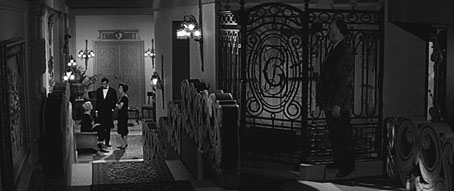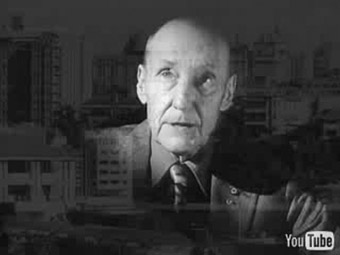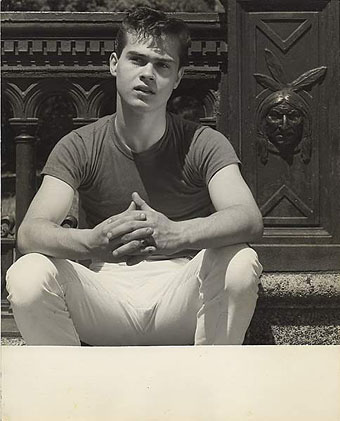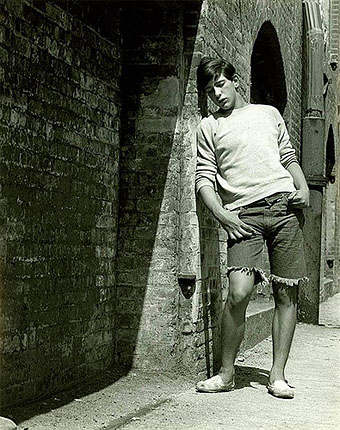A belated shout of appreciation for this film whose distribution appears to have been so limited that everyone missed it, me included. That’s a shame as Roman Coppola’s debut (he’s the son of Francis) has a lot to commend it although it helps if you’re familiar with pulpy European spy/science fiction/horror movies of the late Sixties and the po-faced works of auteurs such as Jean-Luc Godard and Michelangelo Antonioni. CQ pays loving homage to both styles of filmmaking which probably explains why the studio didn’t know what to do with it.
Category: {film}
Film
Electric Seance by Pram
The (Electric Seance) concept was inspired by the discovery that many early pioneers and inventors of electrical apparatus and radiophonic equipment believed that they could use their inventions to contact ‘the other side’.
Scott Johnston
This month’s issue of The Wire has Birmingham group Pram on the cover. Inside they discuss working with filmmaker Scott Johnston whose Electric Seance production was used as part of the group’s Photophonic Experiment shows last year. I have to admit I was never much taken with Pram’s early work, preferring their Too Pure stablemates Laika and Mouse on Mars circa 1997. (Having said that, I’m listening to their Helium album now and it sounds better than I remembered.) I did appreciate the references, however, which encompassed a range of interests including White Noise, Maya Deren and the films of Karel Zeman, all of whom have been the subjects of previous posts here. The band were keen to produce an alternative soundtrack for Zeman’s Invention of Destruction but the Czech Film Archive refused their offer.
Pram seem to have become more interesting in the intervening years, unlike their compatriots. Laika lost me when they got too poppy while Mouse on Mars abandoned melody for a blizzard of increasingly tiresome electronic abstraction. Electric Seance gives some idea of where Pram are at now which isn’t too far removed from the same world of retro-electronica and English spookiness being explored by the Ghost Box artists. The Wire has the soundtrack to Electric Seance as a free download.
And following from yesterday’s reference to Last Year in Marienbad, another film in Scott Johnston’s YouTube collection, The Arranged Time, is a tale of sinister recursion which he says is indebted to Resnais’s classic enigma.
Previously on { feuilleton }
• White Noise: Electric Storms, Radiophonics and the Delian Mode
• The Séance at Hobs Lane
• New Delia Derbyshire
• A playlist for Halloween
• Ghost Box
• The Photophonic Experiment
Hitchcock on film
top left: The Foreign Correspondent; right: Lifeboat.
bottom left: To Catch a Thief; right: North by Northwest.
Watching Alfred Hitchcock’s remake of his own The Man Who Knew Too Much this evening I realised I’d missed the director’s customary cameo appearance, and furthermore didn’t remember which scene it was supposed to be in. One of my film books lists all the cameo spots but better than that are websites such as this one that show you the actual shots.
The Man Who Knew Too Much (1956).
For the record his appearance in The Man Who… is in the crowd at a Marrakech market with his back to the camera, so he’s easier to miss than in other films from this period.
Last Year in Marienbad (1962).
And while we’re on the subject, mention should be made of Hitchcock’s appearance in Alain Resnais’s Last Year in Marienbad, a film he had nothing to do with. A brief shot shows a cardboard cut-out of the director in a hotel corridor and the way the figure is positioned always makes me think he’s floating above the floor. The timing of the appearance is apt—11 minutes in—since Hitchcock always put his cameos near the beginning of the film so as not to distract the audience later on.
Previously on { feuilleton }
• Alex in the Chelsea Drug Store
• Borges in Performance
William Burroughs gives thanks again
I posted the text of William Burroughs’ Thanksgiving Prayer last year as there wasn’t a copy of Gus Van Sant’s film version available anywhere. YouTube has now filled that gap.
Previously on { feuilleton }
• William Burroughs gives thanks
• The Final Academy
• William Burroughs book covers
• Towers Open Fire
Les Demi Dieux revisited
Watching the Kenneth Anger DVDs last week (which really are superb, by the way, and should be on the Christmas shopping lists of anyone interested in underground cinema) had me hunting around for more of the kind of period imagery one sees in his Scorpio Rising (1964) and Kustom Kar Kommandos (1965), imagery that’s erotic if seen with the correct eye (a gay one, naturally). The photos produced by Les Demi Dieux, a New York photographer of the Fifties and Sixties, correspond very much to the atmosphere in Anger’s films, not least because of the location, Scorpio Rising being filmed among the biker groups of Coney Island. I linked to a Flickr page showing some of these photos in March and since then this page has surfaced which sheds a bit more light on the still elusive history of these pictures.
• Les Demi Dieux at Big Kugels
Previously on { feuilleton }
• Relighting the Magick Lantern
• Les Demi Dieux
• James Bidgood
• Kenneth Anger on DVD…finally

